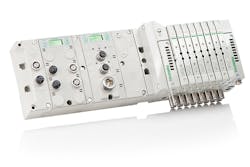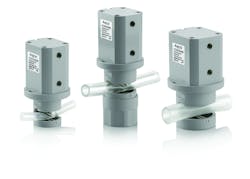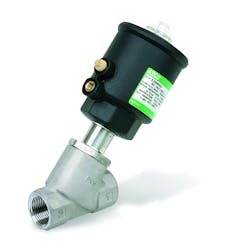Process control automation systems maximize biomanufacturing agility in single-use applications
Biopharmaceutical manufacturing, or biomanufacturing, is changing. With the rise of biologics and personalized medicine, the industry is shifting away from large-scale production processes exclusively. Instead, manufacturers are finding it pays to be agile — which is why many are increasingly adopting single-use technologies to turn over new products and batches quickly and efficiently. Single-use technologies use disposable bioprocessing equipment in place of traditional stainless steel. By eliminating the time-consuming clean-in-place (CIP) and steam-in-place (SIP) processes between batches, single-use technologies cut down on the costs of labor, materials and utilities — all while shortening time to market.
These new technologies play a crucial role in the changing biomanufacturing landscape. Fluid control and automation systems and solutions can help processors reap the benefits of single-use products, including reducing product development time, enhancing operator safety and increasing productivity.
ASCO 580 CHARM node integrates seamlessly into DeltaV DCS S-series via Electronic Marshalling — a tightly integrated remote I/O solution for pneumatic valve manifolds.
The key to minimizing downtime
One of the biggest challenges biomanufacturers face is downtime — something single-use technologies overcome. Generally made from platinum-cured silicone or biopharma-graded plastic, these products are disposed of after use. As a result, single-use products eliminate the need to clean between batches and have a short changeover period compared to stainless-steel equipment. A line changeover for a stainless-steel bioreactor, for example, can take up to 10 hours for the same product — and up to three weeks for a full product changeover. Compare that to a single-use bioreactor, which only requires a few hours between batches. Because of their quick changeovers, single-use products lead to significantly higher throughput and enable smaller, more efficient batches. They can also reduce a facility’s manufacturing footprint, lowering the costs for ventilation, heating and other utilities.
It’s important to work with fluidic system suppliers that offer fluid automation products — released or in development — that benefit biomanufacturers making this leap from large-scale to single-use production processes. These suppliers combine their product offering — which can include valve automation solutions, air preparation equipment, instrumentation and integrated solutions — with industry expertise to provide you with reliable service.
Single-use pinch valve reduces install time and costs
From valve automation solutions to advanced control systems, a variety of solutions can help get a single-use biomanufacturing operation up and running.
Single-use pneumatic pinch valves, for example, achieve process control automation in areas like bioreactor and fermentation tanks, chromatography, tangential flow filter (TFF) skids and other drug discovery lab applications. Look for valves with innovative designs, in which the pinch mechanism holds the soft tubing in place, minimizing any disturbances to process media and preventing tube damage over repeated use.
Your supplier should always keep user safety at the forefront of product designs. Pinch valves, for example, should include a protection guard that allows operators to safely work around the pinching mechanism, as well as a manual override function that lets operators insert or remove tubing without actuating the valve. In addition to keeping operators safer, this enhanced valve design accelerates setup, lowers costs and makes unscheduled maintenance easy — all of which are critical to maximizing uptime in single-use applications.
In addition, the right pinch valve makes no contact with process media, features a high life cycle and provides a reliable pinching force without the need for an electrical connection. It should also resist corrosion due to tube breakage or washdown.
For single-use batch production, the ASCO Series 273 Pneumatic Pinch Valve features an innovative design that enables better tube retention and prevents breakage or damage to the soft tubing over repeated use — virtually eliminating any disturbance from valve motion to process media unlike other products on the market.
A one-stop shop for process control automation
Bear in mind, as the single-use market continues to expand globally, it pays to use a single, global supplier that can deliver a comprehensive fluid control solution. To that end, many suppliers offer a wide range of systems and solutions that enhance product quality, improve reliability and lower operating costs in the biomanufacturing sector.
ASCO Series 290 Angle Body Valves handle various types of fluids in CIP and SIP applications.
In addition to pinch valves, which overcome many of the issues related to downtime and operator safety in single-use applications, many suppliers offer directional valves, communication protocols, air preparation units and other technologies — all of which work together seamlessly so you can focus on what really matters: optimizing your biomanufacturing operation. From design and implementation, to startup and ongoing technical support, your supplier can help your single-use operation stay competitive in a global economy, enabling you to:
Control aggressive fluids with durable valves. Angle body valves handle aggressive fluids, such as steam, hot water, solvents and light slurries, in CIP and SIP applications. Air- or water-pressure-operated with a straight-through design, these valves come with advanced accessories, including a signaling box, compact positioner for proportional control and stroke limiter for even greater precision.
Speed time to market with high-performing valve manifolds. Valve manifolds with modular, flexible designs simplify installation, commissioning and system integration in single-use applications — lowering engineering costs and speeding time to market. These plug-and-play systems include high flow rates, I/O capabilities, compatibility with popular industry protocols and a pressure shutoff function, which allows individual valves to be replaced without halting the production process — further reducing line downtime and maintenance in single-use applications.
Improve valve efficiency with next-generation electronics. Electronic fieldbus platforms provide pneumatic valve manifolds with fieldbus and Ethernet connectivity, as well as a graphics display for configuration, commissioning and diagnostics. They allow programmable logic controllers in single-use systems to more efficiently turn valves on and off. They also channel I/O data from sensors, lights, relays, valves and other I/O devices via various industrial networks.
Minimize downtime with quality air-preparation equipment. Air-preparation devices treat the air quality and pressure in a plant’s pneumatic system. Modular filter regulator lubricator (FRL) assemblies with body-to-body clamps facilitate assembly during installation and service, while optional end plates allow the manifold assembly to be quickly removed by loosening screws — keeping downtime to a minimum in single-use systems.
Optimize plant performance with advanced control systems. Distributed control systems (DCS) can improve manufacturing agility in single-use applications by helping meet demands in real-time. These easy-to-use automation systems often include a suite of services geared toward simplifying operational complexity and lowering project risk. They also adapt to meet specific biomanufacturing needs — scaling easily without adding complexity.
Mukta Sharma is the product marketing manager for Emerson’s fluid control and pneumatics business. She focuses specifically on the life sciences market and, is a lead to new product development globally. Her near-term goal is to help Emerson launch a new generation pneumatic valve line for the single-use market. Mukta is an active member of the International Society of Pharmaceutical Engineers (ISPE) and Society of Women Engineers (SWE). She earned her Bachelor of Business Administration, International Business from Eastern Michigan University. Mukta is presently pursuing an Executive MBA at the SC Johnson Graduate School at Cornell University.




